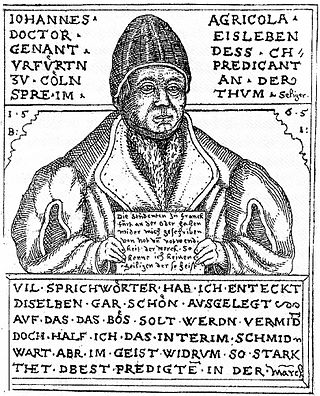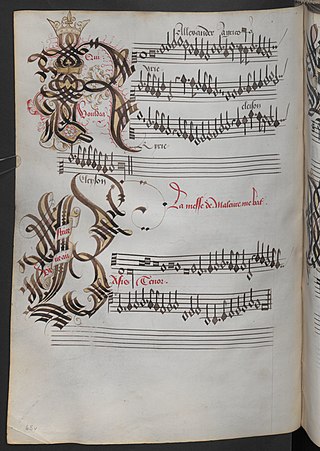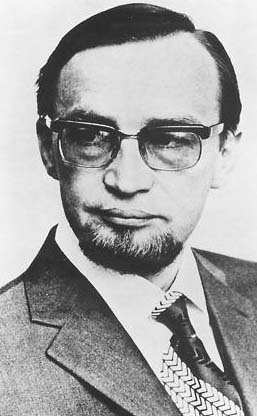External links
Wikisource has original text related to this article:
- An essay discussing the poem's historical antecedents.
"Johannes Agricola in Meditation" (1836) is an early dramatic monologue by Robert Browning. The poem was first published in the Monthly Repository ; later, it appeared in Dramatic Lyrics (1842) paired with Porphyria's Lover under the title "Madhouse Cells".
Agricola's "meditations" serve primarily as a critique of antinomianism. The speaker believes in an extreme form of predestination, claiming that, since he is one of the elect, he can commit any sin without forfeiting his afterlife in heaven.

Johann or Johannes Agricola was a German Protestant Reformer during the Protestant Reformation. He was a follower and friend of Martin Luther, who became his antagonist in the matter of the binding obligation of the law on Christians.

Rodolphus Agricola was a Dutch humanist of the Northern Low Countries, famous for his knowledge of Latin and Greek. He was an educator, musician, builder of church organs, a poet in Latin and the vernacular, a diplomat, a boxer and a Hebrew scholar towards the end of his life. Today, he is best known as the author of De inventione dialectica, the father of Northern European humanism and as a zealous anti-scholastic in the late fifteenth century.

Mikael Agricola was a Finnish Lutheran clergyman who became the de facto founder of literary Finnish and a prominent proponent of the Protestant Reformation in Sweden, including Finland, which was a Swedish territory at the time. He is often called the "father of literary Finnish".

Robert Browning was an English poet and playwright whose dramatic monologues put him high among the Victorian poets. He was noted for irony, characterization, dark humour, social commentary, historical settings and challenging vocabulary and syntax.
Agricola, the Latin word for farmer, may also refer to:
"Porphyria's Lover" is a poem by Robert Browning which was first published as "Porphyria" in the January 1836 issue of Monthly Repository. Browning later republished it in Dramatic Lyrics (1842) paired with "Johannes Agricola in Meditation" under the title "Madhouse Cells". The poem did not receive its definitive title until 1863.

Johannes Carsten Hauch was a Danish poet.

Alexander Agricola was a Netherlandish composer of the Renaissance writing in the Franco-Flemish style. A prominent member of the Grande chapelle, the Habsburg musical establishment, he was a renowned composer in the years around 1500, and his music was widely distributed throughout Europe. He composed music in all of the important sacred and secular styles of the time.

Paavo Juhani Haavikko was a Finnish poet, playwright, essayist and publisher, considered one of the country's most outstanding writers. He published more than 70 works, and his poems have been translated to 12 languages.

Alexander Hegius von Heek was a German humanist, so called from his birthplace Heek.
Dramatic Lyrics is a collection of English poems by Robert Browning, first published in 1842 as the third volume in a series of self-published books entitled Bells and Pomegranates. It is most famous as the first appearance of Browning's poem The Pied Piper of Hamelin, but also contains several of the poet's other best-known pieces, including My Last Duchess, Soliloquy of the Spanish Cloister, Porphyria's Lover, and Johannes Agricola in Meditation.
Johannes Ghiselin (Verbonnet) was a Flemish composer of the Renaissance, active in France, Italy and in the Low Countries. He was a contemporary of Josquin des Prez, and a significant composer of masses, motets, and secular music. His reputation was considerable, as shown by music printer Ottaviano Petrucci's decision to print a complete book of his masses immediately after his similar publication of masses by Josquin – only the second such publication in music history.
"The Sea and the Mirror: A Commentary on Shakespeare's The Tempest" is a long poem by W.H. Auden, written 1942–44, and first published in 1944. Auden regarded the work as “my Ars Poetica, in the same way I believe The Tempest to have been Shakespeare’s.”
Mohamed Garrana Rifaat is an Egyptian composer of classical music, a member of that nation's second generation of such composers.

Stephan Agricola was a Lutheran church reformer. Born in Abensberg, at a young age he joined the Augustinian order. As a monk, he studied Augustine deeply. As a student, he went to the universities in Bologna and Venice, where in 1519 he became a Doctor of Theology. He began to preach on whole books of the Bible in 1520. He was led to Lutheranism through his study of Augustine's works on the scriptures. He was accused of Lutheranism as a heresy. Although he claimed his independence of Luther, he was arrested and imprisoned in Mühldorf on November 17, 1522. In 1523 he escaped and came to Augsburg, where with Urbanus Rhegius he fully accepted the Reformation and translated Johannes Bugenhagen's tract ag. Zwingjli into German. He was on the Lutheran side during the Marburg Colloquy, became pastor in Hof in 1532, took part in the meeting at Schmalkalden in 1537, and signed the Smalcald Articles. He was instrumental in introducing the Reformation in the Upper Palatinate, as he was pastor at Sulzbach beginning in 1542. During the Schmalkaldic War, he had to flee to Eisleben, where he died in old age on April 10–11, 1547. Stephen Agricola was a staunch uncompromising Lutheran, earnest and devoted. His son, Stephen, translated some of Luther's commentaries on the minor prophets.
Nationality words link to articles with information on the nation's poetry or literature.

Niklas Rådström is one of Sweden's most noted and prolific contemporary poets, novelists and playwrights. He is the son of the author Pär Rådström and theater director Anne Marie Rådström.
Frantz Johannes Hansen was a Danish author and was also an amateur musician. He is buried at Assistens Cemetery in Copenhagen.
Valentin Eck (Ecchius) (c. 1494 in Lindau (Bodensee) – before 28 September 1556 in Bardejov) was a Swiss traveling humanists, neo-Latin poet, and scholar. He had ties to the Cracow Academy and the early humanist circle in Cracow.